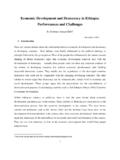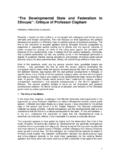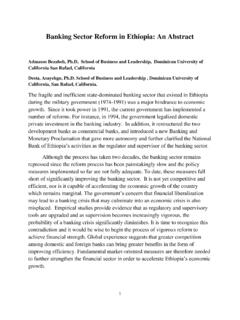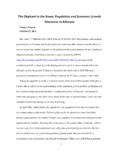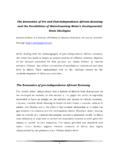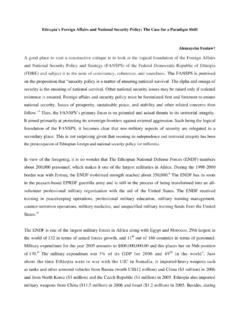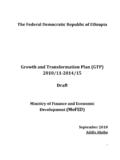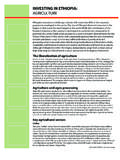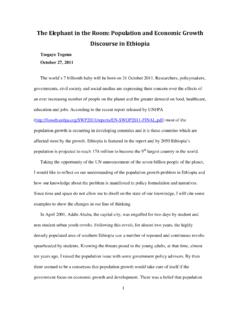Transcription of Ethiopia: Meles Zenawi’s Version of ‘Self-interest’ and ...
1 ethiopia : Meles zenawi s Version of self - interest and Capitalist development Habtamu Alebachew 1. Introductions Despite at its visible incipient stage of growth, capitalism in its ethiopia s contexts has already begun to send its shockwaves across the long established traditions of the people. Capitalist growth in Chinese realities earns for the country the adage factory-house of the world . The Economist in its 2010 edition also calls India s capitalist growth as a supermarket revolution . Both phenomena of capitalist growth have been in the making the previous 25 years in both countries. In ethiopia , the fast expansion in all sectors is evident with an adequate sign of a revolutionary proliferation of the service industry ahead of others. Construction also blossoms itself as a flourishing industry with an expanding absorption capacity of more than the 35% of the total work force now active throughout the country.
2 These developments however were not without nationwide value meandering. One may remember the experience and outlook shocks, which the blanket lifting of command economy in the early 1990s caused mostly in urban ethiopia . Both the public establishment and the staggering private sector of the time felt the vibrancy of the shocks equally but differently. Many public servants and their officials strongly grappled with the new and strange capitalist oriented- regulatory practices. There were many who strongly doubted the healthy functioning of the economy in the virtual absence of government control. These experts and officials were in difficulty to understand clearly the logic of business with a privilege of owner-centered pricing. Some hesitated to accept orders for the removal of restrictions on a dozen of licensing requirements, abolitions of quota-based provisions of goods and economic necessaries, their public rationing and so on.
3 Many more business people, on their part, had to struggle with the real meanings of business under minimal government control. Many interpreted free market practice to mean business without the duty of having license, a self -censured ethics, and earning profit by all means available. After a couple of decades, it is true now that capitalism also unfolds with its gloomy side through the incidences of growth bumps, specifically, inflation, corruption, rent-seeking behaviors and so on. Until recently, when the Ethiopian government has engaged in policy interventions in inflationary controls, the widespread belief was that the private sector aggravated the problem due to the need for unlimited appetite for profit and wealth. This came at the very time when other directly or indirectly related economic upheavals in the developed world have precipitated many stakeholders to raise fundamental questions.
4 Some of the most important questions are these: what are the cardinal rules of capitalist growth that pervasively affect human dispositions to wealth? Is capitalist growth inherently an outcome of human selfishness? If so, how do newly developing societies manage and adjust to this growing value against their egalitarian roots? It is, at this juncture, that economists and development scholars reassert what they call self - interest as either the primary, or one of the locomotives of capitalist growth as well as its bad sides. This argument, in its turn, has provoked divergent views on its relevance particularly to the initial growth and subsequent challenges of capitalism in developing states. Some hold the previous view that the growth and expansion of capitalism is impossible without the force of self - interest at the center-stage across any phenomenon of capitalistic initiation and perpetuation.
5 Others advance a diverging belief that self - interest per se, in its own right, does not serve the genesis of capitalist growth in developing states. As a starter society of capitalistic growth, these debates squarely apply to ethiopia and Ethiopians today than ever before. Thus, what were and are the positions of the late PM, Meles zenawi , the chief architect of ethiopia s capitalistic growth, as both an economist and a political leader on this question? How did he respond to the above concerns? 2. Ethos of the scholarly battle Even though Meles does not cite the following authors and their works in his dissertation, most of the ideas he sets for critique evidently come from them, one way or another. As Meles himself used to do, let us start by briefly assessing Adam Smith and his conception of self - interest and capitalistic growth.
6 To begin with, self - interest as one of the basic dynamos and drivers capitalist growth has been a strict point of scholarly undercurrent since the early 19th century. Though preceded by others in the assertion of liberal economic practices, Adam Smith was probably the first economist to underscore self - interest as the propellant impulse of capitalist growth. Smith in his famous book of 1765, Wealth of Nations , underlines what he calls enlightened self - interest interchangeably with what he terms the invisible hand. Smith arguably qualifies self - self interest as enlightened to refer succinctly to the entrepreneurial spirit and skill to discern the signals of free market operations. For Smith, the inner human impulse to satisfy its self - interest out of the free market ignites expansionary growth than the regular government intervention.
7 This classical view of self - interest has persisted since this period to appear and reappear across scholarly literatures to date. Ayn Rand, one of the most advocates of self - interest , for example, bitterly argues that the abundant riches capitalism brought to America has never been the outcome of any altruistically provided public good . In her work Capitalism: The Unknown Ideal, Rand stresses that the push in individual trading business people to serve their self - interest exclusively produces the incredible size of material and spiritual wealth in the modern world. For Ayan Rand, self - interest is the gravity host of free market, little government intervention, profit making and, liberty, unstoppable capitalistic growth. What governmental altruistic intervention holds for modern societies is the potential danger of inhibiting self - interest , which is innovation and advancement.
8 Nobel-economist Milton Freidman never hesitates to embrace the Radian notion and argument in favor of self - interest in his discussion on the roots of capitalist growth. Freidman identifies what he calls social responsibility as irrelevant to business. In his famous work, The Social Responsibility of Business is to Increase Profits, Freidman highlights self - interest as a maximizer of human ingenuity to create new wealth within an ethically guided free market competition. Social responsibility should not go beyond encouraging restraint from deceptive and fraudulent business engagements and never affect the drive for satisfying self - interest by any means. Freidman adds that the pursuit of self - interest benefits not only the individual actor but also in the end the entire community.
9 This is because the businessperson devotes resources to providing amenities for the community, for example, jobs. Freidman finally concludes that the businesspersons does so not altruistically to help society but again to maximize ones profit through what he calls good will . Occasional challenges came by some prominent businesspeople with intellectual backgrounds like John Mackey to this self - interest paradigm of capitalist growth. Mackey replaced the concept self - interest with reason in his work in 2005, Rethinking the Social Responsibility of Business. Mackey argues that he has been trading not for self - interest but out of love of serving people. He argues that he undertaking business with this belief loses nothing; he says he rather gains more and more profits.
10 However, such sporadic arguments have had little or no weight to affect meaningfully the classical place of self - interest in modern approaches to capitalist growth. self - interest as a worldview of policy makers and scholars continues as a mainstream western value particularly in the United States under differing brands. The concept rugged individualism with broadened or changed meanings of self -dependent, reliant, and diligent personality came into use in the Regan era. American political economists and other scholars since the late 1980s have begun searching for other approaches in order to remedy the negative moral ethos of self - interest in tune with new social demands of the age. This need led to the crop up of such theories of generalized self - interest as rational choice , social choice , public choice and others.

